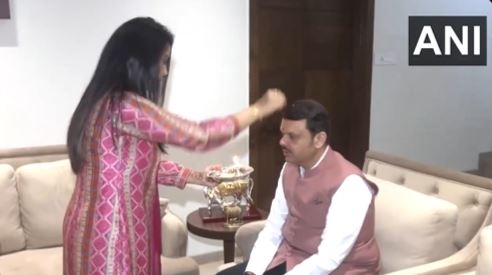
Mona Eltahawy's isn't a face you'd miss in a crowd.
An award-winning Egyptian-American feminist journalist and commentator, Eltahawy makes a political statement with her arresting red hair as much as with her writing. "My body is a canvas," she says, while referring to how female bodies are used for men's agendas and therefore women must reclaim them.
Eltahawy in her first book Headscarves and Hymens: Why the Middle East Needs a Sexual Revolution, released recently, talks about the political, cultural and religious forces that wield their power to control women. She urges young women to question and stand up against this "toxic mix of culture and religion that few seem willing or able to disentangle lest they blaspheme or offend."
Also read -
Why was Mona Eltahawy's NYT article censored by Pakistan?
A campaigner for women's rights in the Middle East, right through the Arab Spring, Eltahawy asserts herself as a liberated Muslim woman who once wore the hijab but chose to reject it. She doesn't see it as a liberating piece of clothing as it is a marker of modesty that was once enforced upon her, and many like her.
Eltahawy talks about the problem with such impositions, about the men who are imposing them, and about the women fighting back in this interview with Catch.
She talks about Donald Trump and the misogyny and bigotry he encourages, about faceless bullies on the internet who, much like Trump, shout to silence women, and about the cultures that have silenced women through generations in the name of 'modesty'.
On supporting Clinton over Trump
As an American citizen, Eltahawy believes it is important to call out Trump supporters for being inherently "racist, misogynistic, homophobic and fascist" as they are "hiding behind false arguments like 'nobody listens to the white working class anymore', 'oh, nobody listens to white disadvantaged men anymore'."
"I think these are all bogus arguments," she says.
"I think what Donald Trump has done is that he has enabled, given a voice to something people had begun to finally learn were shameful things, to believe in them and say it out loud."
But she insists that Trump cannot be seen as divorced from the ideology of the Republican Party.
"For decades, the Republican Party has been courting the racists, misogynists, bigots and the homophobes in the United States. For decades, this has been happening. It hasn't happened overnight," says Eltahawy.
"So Donald Trump is the logical conclusion of decades of the Republican Party deliberately courting racists and misogynists under this umbrella of family values and of a Christianity that worships a white Jesus. And I want to know what kind of religion would allow that kind of hate."
Also read - Is consent sexy? The women behind this webseries say F*ck Yes
Even so, she's not a big fan of 'hawkish' Hillary Clinton, Eltahawy hopes that she'll win "because I think she's a better option than Donald Trump."
"Also, when it comes to women's issues, at least in the United States, within the domestic and national context, she's a much better candidate than Donald Trump who, as revealed through a recording, openly boasts about the sexual assault of women."
However, Eltahawy is more concerned about what the popularity of Trump truly signifies.
"Here's something that remains very frightening and disgraceful," she says, adding, "We will have to deal with all of those people who supported him or turned up to vote for him.
"What are we going to do now when we recognise and see openly and publicly so many Americans who support Trump's fascism, racism, misogyny, bigotry, etc? They're not going to go away overnight. So that's going to remain a problem, and not only in the United States."
Stressing on how the world is regressing, she says, "We have Brexit in the UK, we have Marine Le Pen and her father in France, even in Sweden, which was considered this bastion of progressive social democratic politics, there's a right-wing party in Parliament. We have Modi in India, we have civil war in Syria, Rousseff was impeached by a bunch of sexist, corrupt white men [in Brazil]...
"It's men across the world making it a very difficult place to live in," says Eltahawy.
.@monaeltahawy suggests a curfew on men once a week post 7pm. Audience reacts with thunderous applause #TheBridgeTalks @CatchNews
— Durga M Sengupta (@the_bongrel) October 8, 2016
She understands that this "growing right-wing fascism" is often seen as a "backlash to the pains that we have made as feminists, as leftist types."
And the "backlash" rears its ugly head most visibly on social media. Ironically though, it comes from faceless 'trolls', a relentless lot that Eltahawy, thanks to her Twitter presence, is all too familiar with.
On tackling Twitter trolls
"Those who want to hear my voice have found me. Those who want to troll me have also found me," says Eltahawy.
She explains the two-step treatment she subjects her trolls to.
"A) I exercise my anger on them and I tell them to f*ck off, block them and mute them. And this is not because I'm particularly thin-skinned, I've been doing this for many many years.
"B) I push back on trolls because I want young women to see that a woman can say 'f*ck off!' to a troll. I want young women to see that yes, trolls can come for you but they're often anonymous and cowardly and one of their goals is to rob you of your voice. And one of the best ways to fight back is to insist on having a voice.
You must live in the 1940s. Fuck off. https://t.co/i6m8RdMj6P
— Mona Eltahawy (@monaeltahawy) October 8, 2016
"Nobody is voiceless and we hear someone described as voiceless, we have to ask why," she says. The answer, of course, produces more questions.
Are they "disenfranchised, marginalised, silenced in some way? Or they're expected to not have a voice?"
Women, she says, are "expected to be sweet, and meek, and polite. And that sucks, because meek, polite and nice never got you anywhere."
Also read - This same-sex couple normalises diverse families through their books
"I was speaking to a few medical students in a med school in New York just before I flew to Delhi," Eltahawy shares.
"In my normal talk I say 'F*ck this!' and 'F*ck that!', I curse very openly. One of the medical students came to me and said, 'You know, it's a real relief, especially for the women in science who have to constantly prove themselves. We have to be very cognisant of how we speak. To see a woman so freely express herself [is great].'
I usually ignore/"fuck off" & mute. But important to make clear the difference btwn sexual assault & consensual sex https://t.co/LQ1Ow3KxrK
— Mona Eltahawy (@monaeltahawy) October 8, 2016
Eltahawy doesn't understand why women are constantly apologetic. "So many women begin their sentences with 'I'm sorry but...'. Why? You don't have to be sorry for anything. You exist, you deserve a voice.
"So I recognise what the trolls are trying to do. I fight back against them vehemently because I want young women to see that they can fight them too.
So what's the best way to fight back according to Eltahawy? She has a simple answer.
"Don't cower away from the bully but to see the bully in the eye - even though it's [trolls] an anonymous eye - and say, 'You're a coward. I will not shut up. F*ck off!' And mute them."
On rejecting the hijab
Mona Eltahawy doesn't shy away from taking a political stance online. Nor does she, offline.
"Our bodies are absolutely political instruments. This is why everyone's fighting over our bodies, right?" she asks rhetorically.
"Cover women up. Uncover women up. During times of conflicts and war our bodies become proxy battlefields. Men use our bodies to emasculate other men.
"Sexual assault, violence, rape... I myself was subjected to that," Eltahawy shares.
"The Egyptian riot police beat me, broke both my arms, sexually assaulted me, and I was detained by the police and army.
"It was a form of silencing. My arms were in a cast for three months and I couldn't write using my fingers in the way I usually do because I couldn't type with all ten fingers for 3 months. And during those 3 months of effective silencing, I recognised that before my arms were broken, it was my words that were my instrument, my mode of communication.
"That image of me with my arms in a cast, the writer with her arms in a cast, that was a message. I recognised that my body was now the way that I could convey a message," she says.
That's when she realised that her body was a canvas. "The same way that I used to wear the hijab - that was a canvas for modesty - I now reject this idea of modesty. Whether it's the modesty of the Muslim woman, the modesty of a Catholic nun, or the modesty of the Jewish woman, or the modesty of the Hindu woman.
Also read - Kavita Krishnan on how western attire is seen differently for men & women
"I reject modesty culture because it's an unfair burden on girls and women. Boys and men are never expected to be modest," protests Eltahawy.
"I remind women that I chose to wear the hijab at 16, I chose to take it off at 25, but it took me 8 years to take it off. Why? Because the choosing to wear it is much easier than the choosing to take it off. Because hijab is not a simple piece of cloth.
"Wearing hijab is not like deciding in the morning whether you're going to wear a blue coat or a red coat. It's an imposition," she says.
Proponents of the hijab may argue that wearing it is also an exertion of individuality, but Eltahawy calls bullshit on that.
"I've never ever had any young woman write to me and say, 'My mother has threatened to lock me up at home unless I wear a bikini every day.' But I've had young women write to me and say, 'My mother has threatened to lock me up at home unless I wear a hijab every day.'
"So the hijab is not a neutral piece of cloth, neither is the Jewish woman's wig, neither is the Catholic woman's headscarf... or the Indian woman's ghunghat.
"All of these things are political. They're all imposed on women because they consider a woman's body an area of control."
But does this mean that Mona Eltahawy supports France's burkini ban? No, she says.
"I obviously do not agree with France's burkini ban. I agree on the ban of the face veil everywhere. But I do not ally myself with the right-wing xenophobic groups that push for the face veil ban. I agree on banning them because I think they're a dangerous erasure of women but that's on one side. The burkini is something else."
A woman's body, like her writing or her speech, is yet another domain of expression. To control it is to control her, and that patriarchal control is what Eltahawy is fighting against.
"Who owns the woman's body?" she asks.
"I always say that at the heart of the sexual revolution is the declaration by women that 'I own my body'. Not the state, not the temple, not the mosque, not the church, not the street, and not my family."
First published: 13 October 2016, 12:31 IST







![BJP's Kapil Mishra recreates Shankar Mahadevan’s ‘Breathless’ song to highlight Delhi pollution [WATCH] BJP's Kapil Mishra recreates Shankar Mahadevan’s ‘Breathless’ song to highlight Delhi pollution [WATCH]](https://images.catchnews.com/upload/2022/11/03/kapil-mishra_240884_300x172.png)

![Anupam Kher shares pictures of his toned body on 67th birthday [MUST SEE] Anupam Kher shares pictures of his toned body on 67th birthday [MUST SEE]](https://images.catchnews.com/upload/2022/03/07/Anupam_kher_231145_300x172.jpg)






